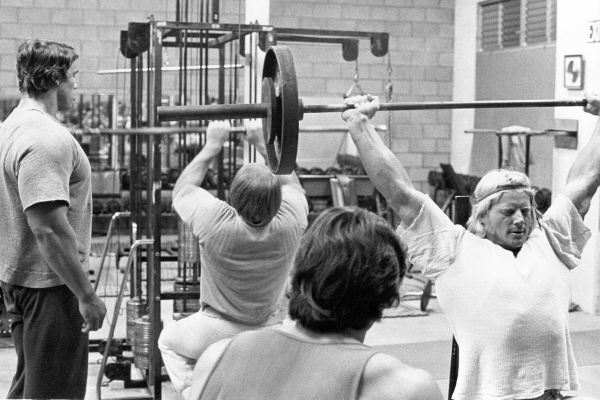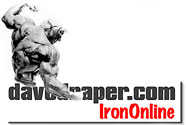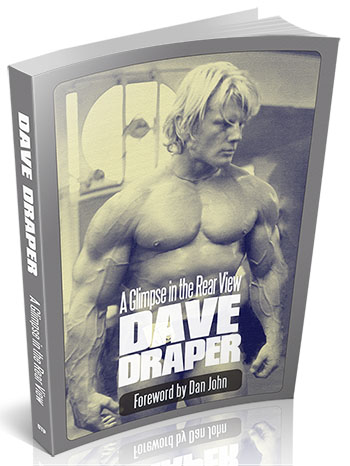Draper Q & A, Part One

Download the full Draper here newsletter
in printable pdf format here.
[Laree here -- We're in the lazy days of summer, so we're going with an interview reprint for a couple of weeks. This is part one of a two-part article. Dig in.]
Dave Draper Q & A , interviewed by Chris Colucci
Q: What was pro bodybuilding's general atmosphere like in the '60s before Arnold's arrival? Did the sport change much after he began competing in the U.S.?
A: The atmosphere was gentle as an undisturbed rhino, rugged as a mountain gorilla and honest as a wholesome child (with 18-inch arms).
In 1960, you could fit pro bodybuilding and the contenders in the palm of your hand (Pearl, Park, Reeves, Eiferman, Eder, Ross, Colbert, Zabo and such). If the guys who lifted weights and had muscles stood side by side, they'd stretch half way down a football field. By 1965, there were fistfuls and they crowded the whole darn field, goalpost to goalpost. The word was out and a good thing was becoming a rage.
It wasn't Arnold who set the clanging action in motion; bodybuilding was accelerating at exponential speed by the time he reached our fruited planes. He certainly grasped mightily the opportunity afforded him by Joe Weider and his (Arnold's) early American friends in ‘68 and rode -- and drove -- the wave to its momentous heights.
Q: What was it like competing against Reg Park and Arnold for the Mr. Universe? Did you see it as "just another contest," or was there anything particular about it?
A: I stepped out of a desirable low-key training limbo to enter a series of shows in the fall of 1970. The classic black-and-white photos by Artie Zeller of Arnold, Zane, Katz, Franco and me portray that six-week summer training season in preparation for the shows. I went from a svelte (scrawny) 205 to a meaty 235 in about six weeks and competed at 230. We were in the zone.
My heart was in my training and I was on a delicious surge. But the competitions were like pulling my teeth one by one with rusty pliers. As for my physique, I was so unready for the London Mr. U when I found myself anxiously late for pre-judging (hi, everyone) and globbing on wheat germ oil (all I had in my gym bag) minutes before my lack-luster, blink-of-an-eye onstage performance. It's not one of my favorite recollections... E for effort, D for dumb.
I went because it sounded like a good idea while squatting and benching and curling in the security of the gym; plus, I was offered a roundtrip ticket to Europe and this poor Jersey boy couldn't turn down the opportunity to travel for free. I had about 40 bucks in my pocket and a gym bag full of canned tuna and supplements, a change of clothes and a toothbrush. Nevertheless, the experiences, both good and not-so-good, were plentiful and priceless.
I saw Arnold and Reg at the pre-judging... "You're late, Draper"... pretty sure it was them... nice guys.
Q: It seems like back then, titles like Mr. Universe and Mr. America were just as important, and just as recognizable, as the Mr. Olympia, but that's not the case today. Does that effect how the public views the sport?
A: We're talking about different animals. I'm not sure how today's public views the sport, or, perhaps, I don't understand your question. Let me ramble. The title, Mr. Olympia, and the subsequent pro titles, were introduced post-1965 to accommodate and excite the growing mobs of participants and spectators.
Mr. America and Mr. Universe, though altogether real, original and admired, became quaint. Bodybuilding grew like a weed and lean bodies were "in," gyms were on every other street corner; muscle mags featured girly foldouts and hyped enough exotic supplements to kill a race horse and its trainer. Someone -- not the bodybuilders -- was making big bucks.
As with most things that grow quickly, something was lost in the expansion. Throw excess and commerce, greed and power and plump marketeers into any wholesome mix and you produce separation and clumps, occasional bitterness and far too much to ingest, digest and savor.
Musclebuilding is an enormous industry on the cutting edge, right along texting and cloning. Swell. It's also on the edge of a cliff. Take me to the dungeon.
Q: You've written that you decided to retire from competing because, "living in Venice in the '60s was like living in a junkyard with a bunch of junkyard dogs." That doesn't sound like the classic Venice Beach we usually hear about, full of camaraderie, where bodybuilders helped each other out. Why is that? Was there a side of the classic Venice Beach we don't know about?
A: I enjoyed Venice as one might enjoy a lunch of hotdogs and pop on some bleachers at a Super Bowl: scrumptious, oddly satisfying, not exactly healthy, exciting, delirious and exhausting. The quarterback is phenomenal, the wide receiver can catch the ball without looking and the linemen crack helmets at the snap of the ball.
I love all dogs, even those of the junkyard variety. They drool, bark and snarl, but don't bite unless you're mean or give them the chance. Besides... they're good dogs, when not fenced in and half-starved.
I stopped competing because it I didn't like to compete. For a short season of my life, it seemed like the thing to do, like after-school classes or volunteer work at the community center. Competition stood between me and the curious relief and play of hoisting the hard, cold iron: the private exertion, the personal discipline, the pure delight, the absolute devotion and the daily fulfillment of lifting weights and building muscle and strength.
I also had the peculiar notion -- call me old-fashioned -- that muscle and strength were most complete when put to work at something you love. I withdrew from competition, continued to blast the weights around at sunrise and dug into building over-sized furniture with my hands. I morphed into an authentic, accidental, long-haired '60s dropout with 19-inch biceps.
The Dungeon was heaven, Joe Gold's was paradise, I loved my training companions, but the devil lurked in the shadows.
Q: You worked for the Weider Barbell Company for several years. Is it true that you two parted ways because you decided to stop competing? Did Arnold's arrival and rise to the Olympia play a part in your decision to leave the company?
A: We have here a curious coincidence. Less than enamored with Weider Barbell's Fair Treatment Policy of employees and muscleheads, my above-mentioned thin coat of enthusiasm for competition eroded further with the absence of promise and honor, silver and gold. Arnold was rocking in Europe and rolled into America to save the day.
Q: Back in the day, were there certain competitors or training partners you turned to for training or diet advice?
A: We all learned as we worked out and observed one another. Oddly, when not in the gym, our conversations did not turn to shoptalk or muscletalk. You know, like, what do you do for your shoulders, Don... from whence doth thou achieve symmetry, Master Zane?
From Howorth and Scott at Gironda's to Frank, Franco and Arnold at Joe Gold's to Zabo and Shuey and Eifferman at the Dungeon, we never spoke of workouts and bodybuilding. We trained and ate as we did, applying the basics, guess work, instincts, commonsense, adequate intelligence, prayer and tacitly sharing understanding, knowledge and magic. We knew and respected what each other did and enjoyed each others' company immensely.
Bill Pearl was the only champ I sought advice from: Should I or should I not enter Mr. America? How do I behave and train when traveling out of the country for exhibitions? Can I borrow your posing trunks for the Mr. America contest next week? Which way is the front? He was generous, forthcoming and right-on all those years ago and has practiced and perfected the rare art form since.
More to come next week... save your ticket stubs.
dd
*****
Take a trip over to our
Musclebuilding Q&A Blog
... where Dave allows us a peek into his email outbox.
Did you sign up for Dave's expanded email yet?
It's free, motivating and priceless!
We'll also send you a link to Dave's free
Body Revival Tips and Hints e-report with your confirmation notice.

